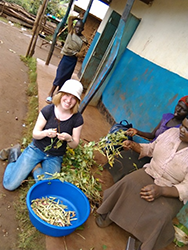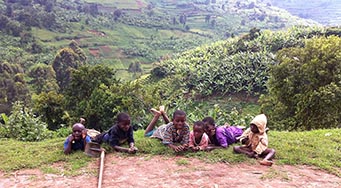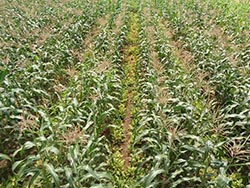Joseph Mhango, a Malawian former N2Africa sponsored MSc student, completed his MSc in Soil Science at Egerton University (Kenya) in 2015. His research was on bio-prospecting for physiological diversity of indigenous Bradyrhizobia species testing their nitrogen fixation efficiency in comparison with the USDA110 strain. After his MSc, he worked for 2 years as a soyabean seed production and technology dissemination officer at IITA in Malawi. On this role, he used his knowledge on nitrogen fixation for the setup of demonstrations of rhizobia inoculant efficacy as well as the preparation and delivery of related training materials. He currently works as a Research Associate under Cassava Breeding for IITA Malawi.
“My name is Mesfin Fenta. Currently am working in Gondar Agricultural Research Center, Amhara Agricultural Reseach Institute as Socioeconomic research assistant. My specialzation (MSc 2017) is Agricultural Economics at University of Gondar, Gondar, Ethiopia by financial support (Fellowship award) of N2Africa project, ILRI, Ethiopia. I have got good knowledge on research problem identification, data analysis, interpretation software and the subject matter. In addition, I got good experience on improved technologies distribution and approach of public private partnership.”
Jan Hüskens, Dutch MSc student who graduated in 2-015 wrote: “I am currently working for the Dutch-South African cassava processing company Dadtco Philafrica (part of Philafrica Foods). The company has a number of mobile cassava processing factories in Mozambique and Ivory Coast which supply starch flour and paste to local bakeries and breweries. The factory is mobile because of the perishability and poor infrastructure which limit transport of cassava over long distances. The main goals of the company are to provide cassava farmers with a reliable market and to substitute expensive wheat and barley imports with local produce.
In 2016, I started as a Young Expert (Young Expert Programme) and was based in Mozambique for two years. My main tasks are assisting the local supply chain and QC/QA teams. Since the company is still quite small, I have to be a jack of all trades. This makes the work very diverse and never boring. At the moment we are not doing that much on agricultural training, so I haven’t had much chance to put what I have learned during my studies into practice. During my N2Africa internship I practiced with creating surveys for mobile devices. This knowledge now comes in handy as I am leading the change to a new data collection program for the supply chain. The experience with Life Cycle Assessments during my MSc-thesis is valuable as we are now working together with WUR to determine the environmental impact of our cassava starch products.“
Laurie van Reemst who finished her Wageningen MSc in 2016 wrote: “Currently, and since I graduated, I’m working for Wageningen Environmental Research, as an agricultural researcher on natural resource management, soil fertility and integrated farming systems. During my thesis research for N2Africa, I lived on Mt Elgon in Uganda for a couple of months, working on climbing bean adaptation by farmers. Totally unexpected, I was send back to Uganda again, and I’m currently living there still. The knowledge I gained from the field work I did, the people I met, the agronomy of legumes I had to understand during my thesis research is what I still use, almost on a daily basis. When talking with farmers I always seek to find the way they use legumes in their system, and in my Integrated Soil Fertility Management trainings I always spend sufficient time on legumes, showing them the benefits, asking them for their own experiences with legumes and explaining them how legumes can have many benefits, integrating it on different levels to their farm management, based on their farming systems and most important farm output.“
Donald Siyeni from Malawi, a beneficiary of N2Africa MSc scholarship in 2016 wrote: “The knowledge gained during and after graduation has been put into direct use. I have been implementing a more similar work to my MSc thesis research work with Agricultural Productivity Programme for Southern Africa (APPSA) for 3 years in which I have been out scaling use of Rhizobia inoculant and Fertilizer application to Soyabean. I hope to publish the results soon. Aside to that, I was also evaluating rhizobia strains for soyabean and groundnut produced and marketed by BASF which led to eventual release by the Agricultural Technology Clearing Committee (ATCC) in Malawi (in October 2017). Proudly, we have now new strains on the market from this work for soyabean and groundnuts. I wish if I had access to more strains produced by N2Africa for further testing under Malawian conditions.”
“I am Sisay Belete from Ambo University, Ethiopia. I was among the beneficiaries of N2Africa project graduate research fellowship during my study of MSc in Animal nutrition at Hawassa University. My research title was “Effects of phosphorus fertilizer and inoculation on yield and nutritive values of grain and haulm of selected grain legumes in mixed crop-livestock production system of Ethiopia”. The research was conducted with close collaboration with N2Africa project partnership institutions in Ethiopia and I received full sponsorship for the research from the project.
During my MSc thesis research work, I have built immense practical knowledge and skills in the area of my specialization (Animal nutrition) as well as how to conducted research.
It was also an opportunity to get practical experience in the animal nutrition laboratory at ILRI-Addis Abeba campus, Ethiopia. Now I am working as lecturer at Ambo University, department of animal science. I am giving the courses such as ‘Forage & Pasture Crops Production & Management, Principle of Animal Nutrition; and Applied Animal Nutrition & Feed Processing for animal science students and the course Animal Feeds and Nutrition for veterinary science students at Ambo University. In addition to the teaching work, I am also on the way to become engaged in some community based research and services which are conducted with my University for the local communities in the area of my specialization. Generally, I feel that the project significantly contribute in my professional qualification which in other hand benefits the country.”
| Eva Thuijsman – Research assistant with N2Africa in Wageningen: “For my MSc internship and thesis with N2Africa at Wageningen University I did research in the highlands of Uganda (on adaptation trials) and Tanzania (on maize-bean intercropping) in 2015 and 2016. The diverse work – surveying, crop measurements, dealing with qualitative and quantitative data, meeting farmers, working outdoors and indoors – and the international team appealed to me a lot and I was very grateful for the opportunity to stay on as a research assistant with N2Africa after graduating in April 2017. I now mainly use the experience gained during my field work to analyse and interpret household data. Working with N2Africa I continue to learn a lot about the challenges farmers face and about the scope and tailoring of project interventions and sustainable intensification.” |  |
Verena Mitschke: “After completing my MSc International Development Studies at Wageningen University in March 2017, I moved to Kampala, Uganda to intern for the German Society for International Cooperation (GIZ) from April to September 2017. I worked for the energy access partnership Energising Development (EnDev), which is active in 25 countries in Africa, Asia and Latin America and promotes sustainable access to modern energy services for the poor. Afterwards, I volunteered for a German refugee centre until I moved to Brussels, Belgium in June 2018 to work for the European Group of the International Federation of Organic Agriculture Movements (IFOAM EU) that aims for the adoption of ecologically, socially and economically sound agricultural systems based on organic principles. Thanks to my work with and for N2Africa, I was able to improve my organisation skills, my ability to work in foreign countries and communicate with people from different cultural backgrounds, and gained vast knowledge on the agricultural value chain, the agricultural production cycle and nitrogen fixation.”
“I am Bharathwaj Sridhar, an N2Africa intern from Wageningen University 2014-2015. I presented my internship report on Adoption of climbing beans among small holder farmers in Kashambya subcounty, south western Uganda.
I am currently the Business Developer of FSMC (India), a subsidy of Waste (The Netherlands). We work with co-composting activities across India. The knowledge of market research, understanding rural communities, which I use very much nowadays today, apart from designing scientific tools for rural ethnocentric approach were my biggest learnings from N2Africa. To present my experience in a single sentence, it carved my career towards working for development of rural communities.”
Martin Koinange, a Kenyan MSc student who finalized his studies on “Influence of biochar amendment on the effectiveness of elite Kenyan rhizobia nodulating common bean (Phaseolus vulgaris L.)” in 2015, is currently working with MEA Limited as the Biofix Manager. Biofix is a Rhizobia-based legume inoculant, manufactured by MEA Limited under the licensing of University of Nairobi. His duties are 1) Maintain existing customer accounts and continually recruit new distributors and acquire new customers, 2) Manage the Biofix® production and oversee quality control, 3) Design, set-up and organize product demonstration sites and farmer trainings, 4) Provide extension services to clients, 5) Manage all customer service, relationships and queries. Also handle feedback relating to the product, 6) Design and implement marketing strategies to increase sales/market share, 7) Maintain a healthy relationship with the product licensor, 8) Ensure that the existing product registration and licenses are up to date, 9) Liaise with the Ministry of Agriculture, Livestock and Fisheries, Universities, agricultural based institutions on matters relating to quality, crop production and marketing.
Elise Bressers accomplished her MSc thesis research within the N2Africa project in 2014: “Together with my research partner Jori Langwerden I went to the Usambara Mountains in Tanzania where we conducted several fertilizer field trials with common bean. We focussed on the relation between Rhizobia inocultation and NPK fertilization. The location was somehow special in the sense that my supervisor Ken Giller already did some fieldwork at the Usambara’s in the early nineties. After finishing my MSc I started working at a company in the Netherlands focussed on the production of fertilizers (mainly trace elements) and compost. As a R&D employee my activities are mainly focussed on plant experiments, in a controlled greenhouse or in large scale field trials. Putting theory into practice and supporting famers with quality product challenges me everyday. I really enjoy working with plant experiments and the experience and knowledge I gained within the N2Africa helps me a lot in this. I still like to think back on the good times in Tanzania and the great people I met.”
Jori Langwerden wrote: “Together with Elise Bressers I did my master thesis as part of the N2Africa programme in the Usambara Mountains. My research goal was to determine the soil constraints for the production of common bean. Since graduation I have been working at SMK, a Dutch NGO that develops and manages sustainable certification standards for plant products. In this position I develop and implement criteria for good agricultural practices. The knowledge I gained during my MSc is very useful for this, especially knowledge about farming systems and the limiting environmental factors for plant growth. During our fieldwork for N2Africa we worked very closely with farmers, which provided me insight in their perspective and the challenges farmers face, which I believe will be useful for my entire career. I valued to be part of N2Africa because it made you part of a large network that shared knowledge, giving an useful impression of the different activities that go behind a large research programme. My research with N2Africa was a very useful and enjoyable experience, and I’m still very thankfull for it.“

|

|
Lisa Piper, who did her internship in 2016-2017 wrote: “Since graduating I have been working for SoilCares Research in Wageningen on the Cropmon project. Cropmon is a project, funded by the Geodata for Agriculture and Water (G4AW) facility. It aims to develop and make available an affordable information service that provides farmers information that helps them to make improved farm management decisions during the growing season. Farmers receive SMS messages based on near real-time satellite imagery and a variety of spatial data layers such as actual weather data, soil analysis data and farm data that inform them on their crops growth. As the crop production researcher my main role on the project is to analyse and link the technical remote sensing data to farm level reality, to develop suitable crop specific and timely SMS messages to be sent to farmers. I am also leading the projects M&E activities where I utilise the skills and experiences from my N2Africa Internship.
Gifty Kumah, who did her MPhil in 2016, is now working with Ghana Education Service (GES) in Ghana as subject teacher at Volo Community Senior High in Volo Volta Region, (West Africa), teaching Agriculture (crop husbandry): “N2Africa has equipped me with technical know-how in crop production. The experience gained, had professionally build my capacity for the teaching work. The practical work with N2Africa has given me the exposure to understand the different types of crops, their soil and growth requirements in Ghana. This work experience with N2Africa has increased my expertise in teaching my students to appreciate the various crops grown under the unimodal and bimodal rainfall regimes in the country. I am therefore grateful to N2Africa for this opportunity given me through their support.
Ibrahim Muhammed Mustapha wrote: “I was an MSc scholar at the Ahmadu Bello University Zaria, Nigeria from 2015-2017. I worked on the optimization of biological nitrogen fixation and yield of groundnut in a savanna alfisol through fertilizer application and soil amendment. My participation in the project improved my knowledge in the production, use and handling of rhizobium inoculants as well as basic microbiology techniques. As a lecturer in soil microbiology at the Federal University of Agriculture, Makurdi, Nigeria, I have been able to incorporate practicals which hitherto was not done in my institution, despite the unavailability of certain equipment. I have also been able to introduce these concepts I learned into my undergraduate project students so that more information will be derived in the southern guinea savanna of Nigeria. I currently supervise seven undergraduate project students on topics ranging from improving biological nitrogen fixation using Bradyrhizobium japonicum and fertilization in legumes to assessing microbial activities after the use of herbicides. These skills being inculcated to others would not have been achievable to this extent without the support of the N2Africa project, which is duly acknowledged.“
Yusuph Namkeleja who wrote his disseratioin in April 2017 wrote: “Currently am working with the Tanzania Wildlife Management Authority (TAWA) under the Ministry of Natural Resources and Tourism as a Wildlife Officer in Kilombero Valley Ramsar Site/ Kilombero Game controlled Area (KVRS/KGCA). My key responsibility is to ensure conservation of the wildlife resources as well as encouraging wise use of those resources through awareness creation, providing conservation education, research and patrols. The knowledge I gained during my MSc studies help in my daily working activities as I studied Msc in Life Sciences and Engineering specializing in Biodiversity and Ecosystem Management which collate with my job. Also it helps me to impart the wide perception of biodiversity that biodiversity conservation shall not focus only in large mammals, birds, reptiles and plants, but have to extend to the microorganism as microorganism is the overlooked unit which is very important for the survival of the whole and all ecosystems. And if microorganisms are well and deeply explored, they may, indirectly, bring a lot of income. Concerning Rhizobilogy knowledge I am not using it directly in my working environment.”
